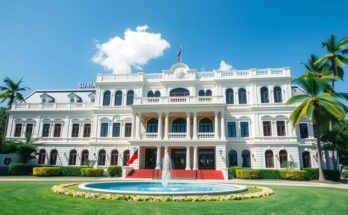Brazil has seen a considerable rise in its Hindu population, growing from 2,905 in 2000 to 21,200 in 2020. This increase reflects a growing interest in Hinduism and immigration trends. The Muslim community in Brazil is also noteworthy, with estimates suggesting numbers between 1.2 and 1.5 million, particularly concentrated in major cities.
In recent years, Brazil has experienced a notable increase in its Hindu population, marking a significant demographic shift in the country. Notably, Brazil, known for its vast Amazon rainforest and rich cultural diversity, is home to nearly 213 million people. Reports indicate that the Hindu population has surged dramatically, particularly over the past eleven years.
As the seventh largest country globally, Brazil boasts the world’s largest Catholic demographic, comprising approximately 123 million individuals. However, recent studies reveal a remarkable rise in the Hindu population, suggesting a shift in the country’s religious landscape.
The predominant faith within Brazil is Christianity, with about 90% of the populace identifying as either Catholic (65%) or Protestant (22%). According to census data, the Hindu community numbered only 2,905 in the year 2000. This figure escalated to 9,500 in 2011, and by 2020, the community reached 21,200 individuals, constituting a mere 0.005% of the total population. Factors contributing to this increase include a heightened interest in Hinduism and a notable rise in immigration to Brazil.
In terms of the Muslim population, a report indicated that approximately 35,200 Muslims were officially recorded in Brazil in 2010. Nevertheless, the Federation of Muslim Associations of Brazil (FAMBRAS) estimates the actual figure to be between 1.2 and 1.5 million, with the largest Muslim communities found in cities such as Sao Paulo, Rio de Janeiro, Curitiba, and Foz do Iguacu, as well as smaller settlements in states like Parana and Rio Grande do Sul.
The Hindu population in Brazil has seen exponential growth, increasing from 2,905 in 2000 to over 21,000 by 2020. This demographic change underscores a broader interest in Hinduism amid a backdrop of Brazil’s historically Christian majority. Additionally, the Muslim community is also significant, with estimates suggesting a much larger population than previously recorded. This shift highlights the evolving religious landscape in Brazil and the influence of migration and cultural exchange.
Original Source: www.india.com




